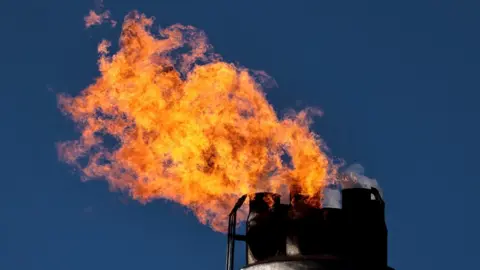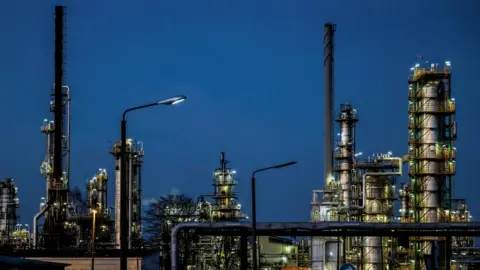Ukraine war: How Germany is getting rid of Russian oil
 Reuters
ReutersThe pipeline that carries Russian oil to Germany is called Friendship, or Druzhba in Russian. But Vladimir Putin's attack on Ukraine has destroyed any lingering feelings of affection.
Druzhba opened in the 1960s, transporting oil more than 5,000km (3,100 miles) from what was then the Soviet Union to Schwedt in former communist East Germany.
The refinery in Schwedt is key to the European Union's plan to phase out Russian oil imports by the end of 2022, a proposal that has won Germany's support.
Since the invasion the German government has dramatically reduced its dependence on Russian oil from 35% to 12%, all of which comes to the refinery in Schwedt.
But people here are worried what an embargo might mean for German regions like this, where thousands of livelihoods depend on Russian energy.
"We are very worried and very shocked," says Schwedt's mayor, Annekathrin Hoppe, who once worked in the refinery herself.
She fears closing the site could destroy the local economy, although at the same time she says the town stands behind Ukraine and understands the urgency of moving away from Russian energy.
After the fall of the Berlin Wall, and the sudden withdrawal of East German state support for local industries, this region went into decline and during the 1990s struggled with unemployment and depopulation. Thanks to the refinery it has managed to get back on its feet. Schwedt today is thriving with newly renovated buildings and spotless streets.
Russian oil was more than just a symbol of friendship. The oil refinery in Schwedt became the region's economic heart.
More than 1,000 people work at the refinery, and another 2,000 at companies nearby that depend on it. The refinery heats most of the homes in Schwedt and provides fuel for more than 90% of vehicles in north-eastern Germany, including Berlin.
Mayor Hoppe says closing the refinery would prompt a collapse in fuel supplies in this region and parts of Poland, impacting drivers, emergency services and even Berlin airport.
That is why German Economy Minister Robert Habeck has spent the past few months on a whirlwind global tour, from Norway to Qatar, to find alternatives to Russian energy.
Last week, after a visit to Poland, he explained in a social media video how Germany had managed to pivot away from Russian oil quicker than expected, and that it could now survive an oil energy embargo.
 Reuters
ReutersMr Habeck pulled no punches, saying prices would go up and sacrifices would have to be made, but he stressed an embargo would no longer lead to economic collapse. This video acted as a green light to other European capitals, as it meant Berlin would now support a ban on Russian oil.
The German government hopes to find other sources of oil for the Schwedt refinery but there is one problem: it is majority-owned by Russian state oil company Rosneft. That's why this is the only site in Germany still dependent on Russian oil.
The government has a solution, to ship oil in via German and Polish ports, but it says this is not possible as long as Rosneft has control. Berlin is now looking at a new law that could allow the German state to take over energy facilities considered crucial to national security.
"I know what war means," restaurant owner Ismail Sakiri told me on his terrace overlooking the Oder river. The scene here is idyllic, but with Poland on the other side of the river, the war in Ukraine feels close.
He grew up in former Yugoslavia and has his own painful experience of conflict. Like most people in Schwedt he fully supports Ukraine and helps Ukrainian refugees coming over the border, he says.
But he also wants his town to survive and believes without the refinery businesses like his would go under.
Germany's approach to Russian energy has proved hard to explain to some of its EU partners. It is unpopular with some German voters who want an overnight ban. But the government has never shifted from its stance that Germany's economy would not survive an immediate embargo.
Instead Berlin is trying to diversify as quickly as possible, and stop Russian imports as soon as the economic hit is manageable. This appears to be working with coal, and now oil as well. The next challenge for Germany is to wean itself off Russian gas.

War in Ukraine: More coverage
